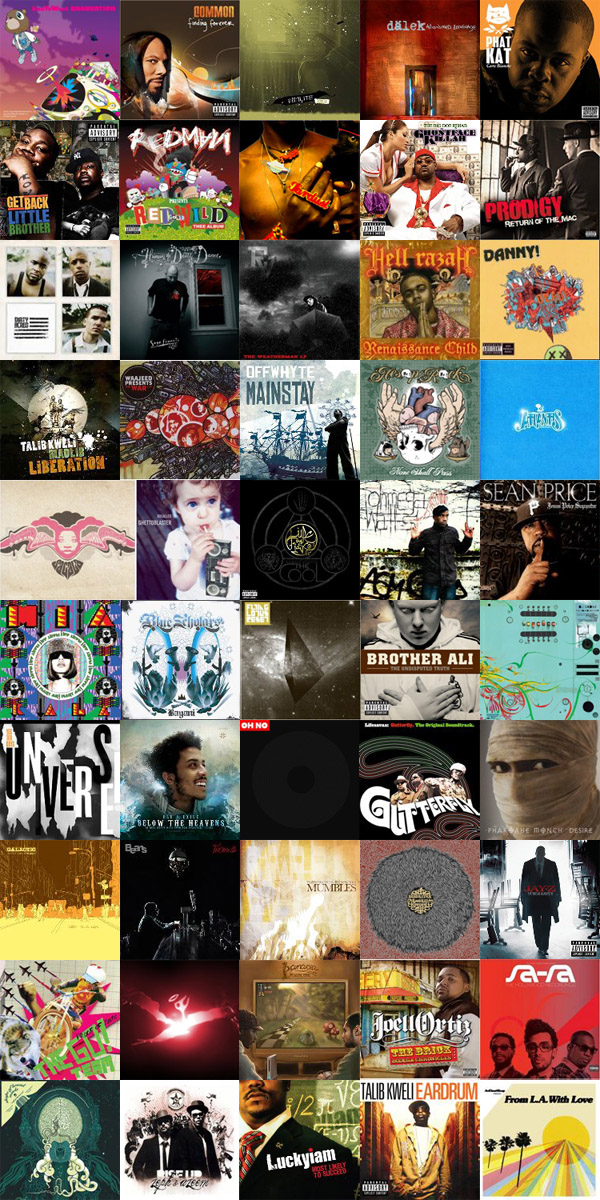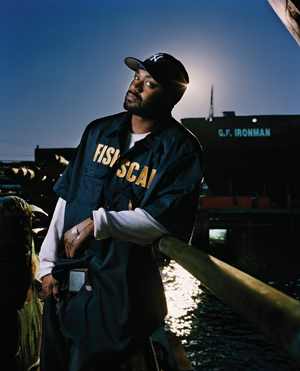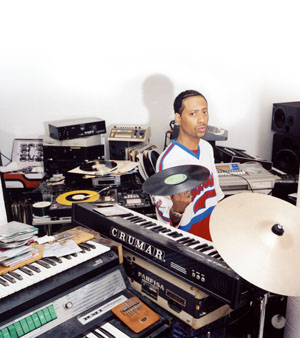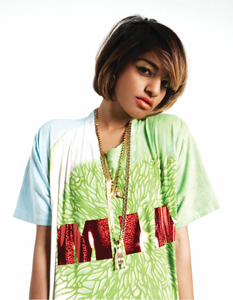
A collection of album art from this year’s selections for the Plug One 50.

Valedictorian of the year: El-P. Photo by Timothy Saccenti.
Last year, as I assembled PlugOneMag.com’s first best-of list, I promised that I would expand the list in 2007. This year, I am proud to offer the Plug One 50.
It wasn’t easy to build. This year has brought many good albums, but few standouts. Some artists such as Kanye West, Common and Talib Kweli maintained a successful balance of hits and filler. Others, particularly El-P, erected magnum opuses that were both breathtaking in content and intimidatingly enigmatic. Unlike in 2006, which brought outstanding efforts from Clipse, Ghostface, Nas and J Dilla, you’ll be hard-pressed to find albums released this year that everyone agreed were classics.
This list is not authoritative. No one, and especially neither I nor Max Herman, who contributed many of the bits for the Plug One 50, can predict history. And I suppose there’s a little bit of self-definition in our selections, too. Why didn’t we include Crime Mob, who recorded a solid album but clearly doesn’t fit into Plug One’s aesthetic? Recognizing hip-hop albums in sub-genres that we don’t cover will undoubtedly be a challenge in the future.
What else did I miss? Well, while I personally stepped my mixtape game up, thanks to the explosion of free mixtapes on the Internet, I still don’t feel comfortable including them on a list of the year’s best. Maybe that will change next year. I didn’t get to a few proper albums, either: Despite my best efforts, I couldn’t land a copy of Wu-Tang Clan’s 8 Diagrams before year’s end. Look for a review of it soon. Others that I haven’t heard yet include Scarface’s Made and UGK’s Underground Kingz.
Finally, there’s quite a few noteworthy albums that were omitted for one reason or another. Some, particularly Witchdoctor’s Diary of an American Witchdoctor, Dizzee Rascal’s Maths & English, and Strong Arm Steady’s Deep Hearted drew a mixed response, and I’m still working out my opinion about them. A handful of well-publicized albums — from artists such as Devin the Dude, Grayskul, and Prefuse 73 — were interesting enough, but nevertheless paled in comparison to their prior achievements.
Still, I think you’ll be impressed by the range of music on the list. Some of the selections will surprise you.
— Mosi Reeves
The Plug One 50
- 1. Aesop Rock, None Shall Pass (Definitive Jux)
- 2. Art Dont Sleep presents, From L.A. with Love (Milan)
- 3. Blue Scholars, Bayani (Massline)
- 4. Beans, Thorns (Adored & Exploited)
- 5. Blu & Exile, Below the Heavens (Sound in Color)
- 6. Brother Ali, The Undisputed Truth (Rhymesayers)
- 7. Busdriver, RoadKillOvercoat (Epitaph)
- 8. Common, Finding Forever (Universal)
- 9. Cunninlynguists, Dirty Acres (Bad Taste)
- 10. Dalek, Abandoned Language (Ipecac)
- 11, Danny!, Danny is Dead EP (self-released)
- 12. Dimlite, This is Embracing (Sonar Kollektiv)
- 13. DJ Vadim, The Sound Catcher (BBE)
- 14. El-P, I’ll Sleep When You’re Dead (Definitive Jux)
- 15. Evidence, The Weatherman (ABB)
- 16. Flying Lotus, Reset EP (Warp)
- 17. Sage Francis, Human the Death Dance (Epitaph)
- 18. Galactic, From the Corner to the Block (Epitaph)
- 19. Ghostface Killah, The Big Doe Rehab (Def Jam)
- 20. The Go! Team, Proof of Youth (Sub Pop)
- 21. Hell Razah, Renaissance Child (Nature Sounds)
- 22. Jay-Z, American Gangster (Roc-A-Fella)
- 23. Joell Ortiz, The Brick (Bodega Chronicles) (Koch)
- 24. k-os, Atlantis: Hymns for Disco (Virgin)
- 25. Talib Kweli, Eardrum (Warner Bros)
- 26. Talib Kweli & Madlib, Liberation (Blacksmith)
- 27. Lifesavas, Gutterfly: The Original Soundtrack (Quannum)
- 28. Little Brother, Getback (ABB)
- 29. Luckyiam, Most Likely to Succeed (Cornerstone R.A.S./Legendary)
- 30. Lupe Fiasco, Lupe Fiasco’s The Cool (Atlantic)
- 31. M.I.A., Kala (Interscope)
- 32. Mumbles, Transformations/Illuminations (Sound in Color)
- 33. Offwhyte, Mainstay (Galapagos4)
- 34. Ohmega Watts, Watts Happening (Ubiquity)
- 35. Oh No, Dr No’s Oxperiment (Stones Throw)
- 36. Panacea, The Scenic Route (Glow in the Dark)
- 37. Pattie Bling & Akebulan Five, Sagala (Ramp)
- 38. Pharoahe Monch, Desire (SRC)
- 39. Phat Kat, Carte Blanche (Look)
- 40. Prodigy, Return of the Mac (Koch)
- 41. Redman, Red Gone Wild (Def Jam)
- 42. Sa-Ra, The Hollywood Recordings (Babygrande)
- 43. Sean Price, Jesus Price Superstar (Duck Down)
- 44. Shape of Broad Minds, Craft of the Lost Art (Lex)
- 45. Socalled, Ghettoblaster (Jdub)
- 46. Waajeed presents, The War L.P. (Bling 47 Group/Fat City)
- 47. Saul Williams, The Rise and Liberation of NiggyTardust! (self-released)
- 48. Kanye West, Graduation (Roc-A-Fella)
- 49. Yesterdays Universe, Prepare for a New Yesterday (Stones Throw)
- 50. Zeph & Azeem, Rise Up (Om)

Hip-hop martyr: DJ Drama. Photo by Zach Wolfe.
Aesop Rock, None Shall Pass (Definitive Jux): After the difficult and convoluted Bazooka Tooth, Aesop Rock returns to form with None Shall Pass, leavening his world-weary cynicism with subtle yet noticeable optimism.
Art Dont Sleep presents, From L.A. with Love (Milan): Los Angeles promoter and tastemaker Andrew Lojero executive produced this compilation of songs and artwork from the West Coast’s finest talent, including Aloe Blacc, Georgia Anne Muldrow, Madlib, Nobody and many others.
Blue Scholars, Bayani (Massline): One of this year’s most inspiring surprises was the second album from Seattle duo Geologic and DJ Sabzi, who proudly touted their political convictions and affinity for brown rice.
Beans, Thorns (Adored & Exploited): Last October, this onetime Antipop Consortium MC dropped a new album on iTunes, hopefully as a prelude to a wider release. Thorns isn’t a glorified mix CD, however, but an amazing torrent of body rocking raps and electronic B-boy aesthetics.
Blu & Exile, Below the Heavens (Sound in Color): A collaboration between MC Blu and Emanon producer DJ Exile, Below the Heavens sounds like an artifact from the early 90s. Blu spouts knuckleheaded wisdom, but isn’t above introspection, and his deft rhymes easily complement Exile’s dusty, throwback beats.
Brother Ali, The Undisputed Truth (Rhymesayers): For this Minneapolis MC’s sophomore long player, he raps like a bluesman over Ant’s melodic beats, fluently revealing details about his divorce and raising his son alone. However, getting personal didn’t always mean looking within, as Ali also took verbal jabs at the government and America’s troubling history.
Busdriver, RoadKillOvercoat (Epitaph): Tongue-twisting commentary on suburban malaise and jittery electronic beats made this Busdriver’s most jarring album to date. While not always successful, it reaffirmed his reputation as a thrilling and challenging artist.
Common, Finding Forever (Universal): On his seventh album and second executive produced by fellow Chicago graduate Kanye West, Common’s sonics veer further into grown-up rap territory with smooth, radio-friendly beats and songs about relationships and everyday people.
Cunninlynguists, Dirty Acres (Bad Taste): Deacon, Natti and producer Kno, onetime Atlanta backpackers turned Kentucky soothsayers, have steep artistic ambitions. Dirty Acres, which explores spirituality, America’s stolen legacy and sexual relationships with Dungeon Family overtones, nearly matches it.
Dalek, Abandoned Language (Ipecac): Although rarely acknowledged by hip-hop fans over- or underground, Dalek is among this decade’s premier experimentalists. Abandoned Language continued the Jersey trio’s appetite for contentious revolutionary rhymes and dark, antediluvian beats.

Destroy and rebuild: Ghostface Killah. Photo by Scott Schafer.
Danny!, Danny is Dead EP (self-released): More than just the winner of Definitive Jux’s public talent search contest last spring, South Carolina rapper/producer Danny Swain is a unique artist. Danny is Dead, where he writes songs about life as a struggling musician with ruminative wit and references to Salvador Dali’s melting clocks, is proof.
Dimlite, This is Embracing (Sonar Kollektiv): Originally released in Europe 2006, Berlin producer Dimlite’s second album drew an enthusiastic cult audience, thanks to his infectiously glitchy and progressive downtempo beats.
DJ Vadim, The Sound Catcher (BBE): DJ Vadim’s fifth album cemented his evolution from groundbreaking hip-hop producer to electronic soul auteur, with help from Abstract Rude, turntablist Mr. Thing, singer Kathrin DeBoer and others.
El-P, I’ll Sleep When You’re Dead (Definitive Jux): Few hip-hop artists have captured the chaos of NYC and post-millennial urban life like Brooklyn native El-P does on his superb sophomore solo release. With angst-drenched verses as complex as his synth-driven beats, this ambitious producer-on-the-mic outdid himself in 2007.
Evidence, The Weatherman (ABB): Dilated Peoples’ brand of hip-hop has often been criticized as being too bare-bones, which makes Evidence’s revelatory debut such a triumph. Tracks dealing with growing up in L.A. and his mom’s passing are treated with top-notch productions from himself, the Alchemist and a host of seasoned West Coast beatsmiths such as Sid Roams, Joey Chavez, and DJ Khalil.
Flying Lotus, Reset EP (Warp): Flying Lotus’ debut EP for the classic Warp imprint was an inevitable letdown after all the online buzz accorded him this year. But for less demanding listeners, there was much to like, particularly the underground hit “Tea-Leaf Dancers” with Andreya Triana.
Sage Francis, Human the Death Dance (Epitaph): On his somewhat uneven third solo album, Sage Francis’ distinguished himself with his mastery of language and ability to create complex songs that sounded more substantive than the average hip-hop track.
Galactic, From the Corner to the Block (Epitaph): New Orleans funk-jam band Galactic’s ferocious reputation as talented road warriors didn’t draw much attention outside jam band communities until From the Corner to the Block, which contained hot and sticky collaborations with rappers such Mr. Lif and Lyrics Born.
The Go! Team, Proof of Youth (Sub Pop): Retreating from the sample-heavy cataclysm of Thunder, Lightning, Strike!, the Go! Team assembled a crack band to illustrate its colorful, kaleidoscopic party jams, with mostly successful results.
Ghostface Killah, The Big Doe Rehab (Def Jam): By focusing almost exclusively on hood politics, Ghostface’s latest epic isn’t as good as Fishscale. But it contains many of the elements, from dusty soul loops to virtuoso lyrical metaphors, that fans have to come love about him.

Best producer of the 00s?: Madlib. Photo by Chris Woodcock.
Hell Razah, Renaissance Child (Nature Sounds): It’s too bad that people tend to dismiss second-team Wu-Tang releases, because Hell Razah’s solo shot for Nature Sounds was worth a listen. More than ordinary backpack thug material, it was an excellent mix of knowledge rhymes, battle raps, and guest shots from Talib Kweli and Ras Kass, among others.
Jay-Z, American Gangster (Roc-A-Fella): After last year’s Kingdom Come debacle, Shawn Carter returned to familiar territory with this album “inspired” by Denzel Washington’s Frank Lucas biopic. He’s in fine form here, sounding confident and masterful as he weaves tales of heroin-dealing and street hustling over cinematic and orchestral beats.
Joell Ortiz, The Brick (Bodega Chronicles) (Koch): Joell Ortiz’s debut album after years of mix CDs and 12-inch singles may have seemed like street-hop-by-the-numbers. But Ortiz’s thoughtful and honest rhymes transcended his solid yet predictable musical surroundings.
k-os, Atlantis: Hymns for Disco (Virgin): Renowned in his native Canada yet largely ignored in the States, this Toronto producer/MC’s third LP was one of the most upbeat hip-hop releases of the year. When not returning to the old school party jams of past works, k-os used influences such as vintage rock and R&B for a soulful and oft-uplifting listen.
Talib Kweli, Eardrum (Warner Bros): Talib’s latest major label effort isn’t his best work yet, but what the Brooklyn wordsmith’s new album lacks in continuity is made up for by a handful of divergent sure shots, including the UGK-assisted “Country Cousins” and the Will.i.am-produced pop number “Hot Thing.”

Grown man music: Common. Photo by Gregory Scaffidi.
Talib Kweli & Madlib, Liberation (Blacksmith): Madlib produced this mini-album, which was given away as a free download in January. Many hailed its dusty, soulful raps as a return to form for Kweli after years of frustrating, tentative attempts at a mainstream breakthrough.
Lifesavas, Gutterfly: The Original Soundtrack (Quannum): In an attempt to make fans rethink what the Lifesavas actually represent, Jumbo the Garbageman, Vursatyl, and DJ Rev. Shines delivered the ultimate concept album of 2007. Taking a heavy influence from the blaxploitation film era, this Portland, Ore. trio brought cinematic hip-hop to the next level with developed characters and an actual storyline.
Little Brother, Getback (ABB): After splitting with Atlantic Records and producer 9th Wonder, MCs Phonte and Rapper Big Pooh carried on the LB name independently with their third and arguably most substantial album. Over a host of mostly mid-tempo beats, Phonte and Pooh perfected grown-man musings with a strong sense of humor.
Luckyiam, Most Likely to Succeed (Cornerstone R.A.S./Legendary): Living Legends co-founder and certified indie hip-hop vet Luckyiam keeps it simple and true to life on his latest release, candidly rapping about girls, his childhood, and the record industry.
Lupe Fiasco, Lupe Fiasco’s The Cool (Atlantic): It is possible to enjoy this collection of deep, jazzy songs, which Lupe enhances with fast raps and soulful, emo-life crooning, without understanding its convoluted storyline about a fledging MC undone by the rap industry.

Global pop wondergirl: M.I.A. Photo by Janette Beckman.
M.I.A., Kala (Interscope): On her follow-up to the critically adored Arular, M.I.A. and her team of producers (including Switch and Diplo) jettison the favela booty funk for a stellar blend of global pop politics and electro memories.
Mumbles, Transformations/Illuminations (Sound in Color): Contrary to some reports, this isn’t the sequel to Aceyalone’s classic A Book of Human Language, though Aceyalone makes a few appearances. Instead, producer Mumbles meditates on religion and spirituality with cool, sensuous beats and contributions from Cut Chemist, Flora Purim and others.
Offwhyte, Mainstay (Galapagos4): The Chicago label Galapagos4 has been quietly cranking out quality indie hip-hop for years now, and the latest from rapper Offwhyte is a good example. More a freestyle epic than a concept piece, it finds him musing on everything from the state of the music industry to the state of the world.
Ohmega Watts, Watts Happening (Ubiquity): Ohmega Watts’ second LP is undoubtedly ambitious and a little all over the place. To his credit, the Portland, Ore.-based MC/producer proves to be well-rounded, dropping uplifting hip-hop, Brazilian soul tracks and everything in between.
Oh No, Dr No’s Oxperiment (Stones Throw): While Stones Throw manager Egon technically did some of the crate digging for Oh No’s new instrumental effort, the way Madlib’s little brother fervently reanimates Middle Eastern and Mediterranean samples for these 28 beats is impressive.
Panacea, The Scenic Route (Glow in the Dark): Hip-hop softies or smooth jazz masters? No matter what you may think of this Washington, D.C. duo, they undoubtedly leave a lasting impression. Their second album in two years was a memorable excursion, pairing abstract rhymes with Tribe Called Quest-like quietude.
Pattie Bling & Akebulan Five, Sagala (Ramp): Before she embarked on her disappointing G&D collaboration with Dudley Perkins, Georgia Anne Muldrow issued this EP-length collection of beguiling and brittle soul.
Pharoahe Monch, Desire (SRC): Former Organized Konfusion MC/beat-maker understandably raps a lot about his emancipation from the stifling record industry on his long overdue sophomore solo effort. Thankfully, he also brings us back to days of dark, cinematic lyricism on pointed tracks such as “When the Gun Draws.”
Phat Kat, Carte Blanche (Look): After years of toiling in underground Detroit, Phat Kat finally created an album worthy of his talents as a hardcore spitter. Stacked with beats by J Dilla and others, Carte Blanche teemed with mixtape-ready hits.
Prodigy, Return of the Mac (Koch): With the Alchemist laying down cinematic gangster themes, Mobb Deep’s beloved rhymer Prodigy provides some of his most vivid thug raps in years.

Most slept-on: Jneiro Jarel. Lex Records publicity photo.
Redman, Red Gone Wild (Def Jam): Is it possible to make good, relevant hip-hop after nearly two decades in the business? Red Gone Wild is evidence to the affirmative. Though it drew mixed reviews, Redman undoubtedly proves that there are few better at crafting clever, weed-inspired punchlines.
Sa-Ra, The Hollywood Recordings (Babygrande): While not entirely a hip-hop record, this L.A.-based production trio – comprised of Taz Arnold, Shafiq Husayn, and Om’Mas Keith – produce a synthy brand of soul here that meshes with both rappers (Talib Kweli, Pharoahe Monch) and vocalists (Erykah Badu, Rozzi Daime) alike.
Sean Price, Jesus Price Supastar (Duck Down): In recent years, some critics and fans haven’t offered much high praise for Boot Camp Click releases, but the gruff-voiced Sean Price’s sophomore solo shot is an exception. With robust beats (from Illmind, 9th Wonder, and others) and even harder rhymes, Sean kept the BCC brand ingrained in listener’s minds.
Shape of Broad Minds, Craft of the Lost Art (Lex): This bugged out disc from Jneiro Jarel sees the slept-on beat maker/rhymer take on multiple alter egos (Dr. Who Dat?, Panama Black, Roc Wun) for an unpredictable trek through space boogie, psychedelic soul, and jazz-inspired hip-hop.
Socalled, Ghettoblaster (Jdub): On Ghettoblaster, this Canadian musician mashes up raps by C-Rayz Walz, klezmer melodies, JBs trombonist Fred Wesley, onetime electroclash rapper and Feist producer Gonzales, and other disparate things into a weird, eclectic and endlessly inventive journey through Jewish bohemia.
Waajeed presents, The War L.P. (Bling 47 Group/Fat City): Detroit producer Waajeed, founding member of Slum Village and one-half of Platinum Pied Pipers, assembled a soulful hip-hop compilation to showcase a flurry of soon-to-blow talents, including Invincible, Tiombe Lockhart, as well as beats from the late James “J Dilla” Yancey.
Saul Williams, The Rise and Liberation of NiggyTardust! (self-released): Most of the media focused on NiggyTardust’s status as a free download, celebrating how producer Trent Reznor had broken away from the major label machine, and only mentioned Williams when they sought to criticize its music. As the hype dies down, however, this album deserves a deeper listen in order to understand Williams’ satire on contemporary black culture.
Kanye West, Graduation (Roc-A-Fella): With his expensive tastes and gargantuan ego, Kanye West isn’t always that easy to relate to. Still, his articulate delivery and epic production makes Graduation tough to turn off.
Yesterdays Universe, Prepare for a New Yesterday (Stones Throw): Sometimes it’s so difficult to keep up with the prodigious Madlib that his best work tends to get lost. Prepare for a New Yesterday is an experimental soul-jazz record, but it may be the best of the four albums he produced this year, and has an artistic vision that shines amidst the deluge.
Zeph & Azeem, Rise Up (Om): The first full-length collaboration between Bay Area DJ/producer Zeph and MC/poet Azeem is the rare release that successfully couples party-worthy beats with revolutionary raps. Despite a few missteps, this disc bumps.
R.I.P. Pimp C.

